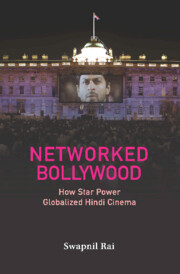Book contents
- Frontmatter
- Dedication
- Contents
- List of Figures
- List of Tables
- Acknowledgements
- List of Abbreviations
- Introduction: Star Switching Power in Networked Bollywood
- 1 Of Vagabonds and Wayfarers: Raj Kapoor, Dev Anand, and Hindi Cinema’s Family-Led Film Clusters
- 2 King of Kings: Amitabh Bachchan and the Emergence of Bollywood’s Corporate Networks
- 3 Global Dreamz: Shah Rukh Khan and Aamir Khan Usher Global Bollywood into the New Millennium
- 4 Global Beauty Queens: Aishwarya Rai, Priyanka Chopra, and Female Star Switching Power
- 5 Bards of Change: How Streaming Platforms and State–Industry Alliance Are Reconfiguring Star Power in Networked Bollywood
- Notes
- Index
3 - Global Dreamz: Shah Rukh Khan and Aamir Khan Usher Global Bollywood into the New Millennium
Published online by Cambridge University Press: 09 January 2024
- Frontmatter
- Dedication
- Contents
- List of Figures
- List of Tables
- Acknowledgements
- List of Abbreviations
- Introduction: Star Switching Power in Networked Bollywood
- 1 Of Vagabonds and Wayfarers: Raj Kapoor, Dev Anand, and Hindi Cinema’s Family-Led Film Clusters
- 2 King of Kings: Amitabh Bachchan and the Emergence of Bollywood’s Corporate Networks
- 3 Global Dreamz: Shah Rukh Khan and Aamir Khan Usher Global Bollywood into the New Millennium
- 4 Global Beauty Queens: Aishwarya Rai, Priyanka Chopra, and Female Star Switching Power
- 5 Bards of Change: How Streaming Platforms and State–Industry Alliance Are Reconfiguring Star Power in Networked Bollywood
- Notes
- Index
Summary
I was intrigued by [Kabhi Khushi Kabhi Gham (2001, Shah Rukh Khan’s film)], but I was even more intrigued by the effect it had on my mother. I cannot remember ever seeing my mother cry, not even at funerals. But there she was watching this film, and she had tears running down her face.
—Julia Wessel, editor of German Bollywood magazine IshqJulia Wessel, a twenty-five-year-old German student, was so moved by the phenomenon and fandom around Shah Rukh Khan (hereafter, SRK) that she quit her cultural anthropology degree to edit a German Bollywood magazine. SRK’s popularity among his German fans spurred the creation of fanzines, industry infrastructure, and collaboration that opened up a new market for Bollywood in the early 2000s. Bollywood and SRK’s enthusiastic reception was transposed to the realm of cultural diplomacy when Michael Steiner, the German ambassador to India (2012–2015), created a Bollywood-style video, ‘Lebe Jetzt [Live Now]: Loving Bollywood Too Much’. The video, a homage to SRK and Bollywood, featured the German envoy dressed as SRK. Along with his wife and the Indian foreign minister Salman Khurshid, they lip-synced the lyrics of SRK’s song ‘Kal Ho Naa Ho’ (Tomorrow May Never Come, 2003).
In October 2019, ahead of a summit between the Chinese president, Xi Jinping, and the Indian prime minister, Narendra Modi, China’s ambassador to India, Sun Weidong, invoked Bollywood megastar Aamir Khan (hereafter, Khan) (beloved by the Chinese) to emphasize the cultural bonhomie between India and China. At the height of the cross-border skirmish between India and China in 2017, Khan’s Dangal (Wrestling Competition, 2016, dir. Nitesh Tiwari) became a means to de-escalate tensions, as the Chinese envoy repeatedly emphasized Xi’s admiration for Khan and love for Bollywood, describing Xi as the ‘biggest promoter of Bollywood in China’. Khan’s inroads into the Chinese market were catalysed by distribution through pirate economy networks. His film 3 Idiots (2009, dir. Rajkumar Hirani) instigated a cult fandom that created these inroads for Bollywood into China. 3 Idiots has 1.4 million ratings on Douban, a film website in China similar to IMDb, on which it is ranked the twelfth highest-rated film of all time. Chinese film and social media websites like Douban, MTime, and Weibo abound with fans centred on Khan, addressing him variously as ‘Uncle Mi’, ‘Uncle Shu’, and the ‘conscience of India’.
- Type
- Chapter
- Information
- Networked BollywoodHow Star Power Globalized Hindi Cinema, pp. 118 - 170Publisher: Cambridge University PressPrint publication year: 2024



